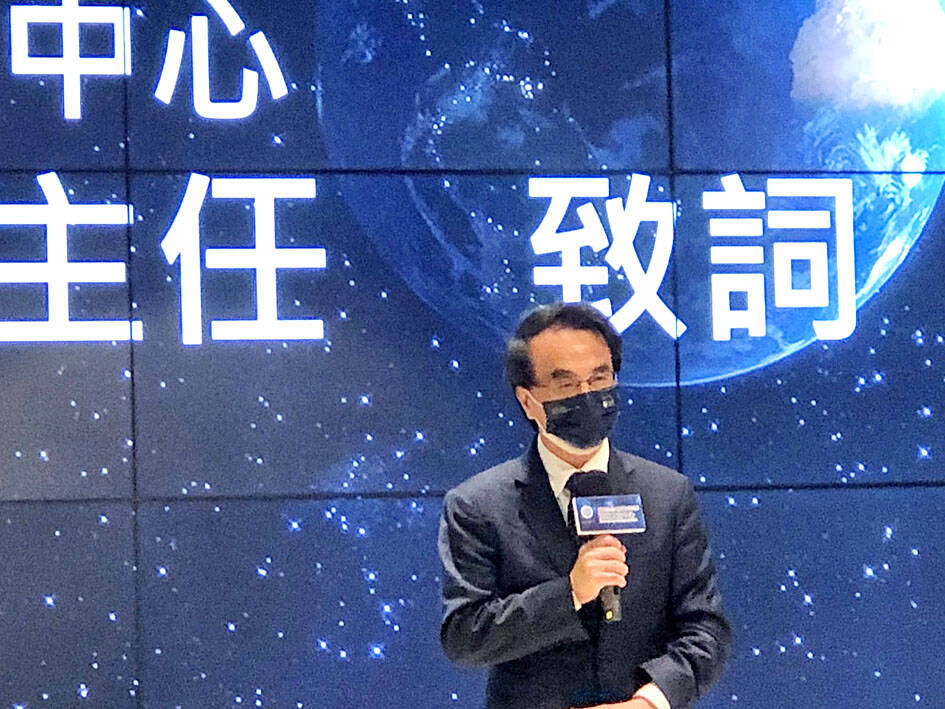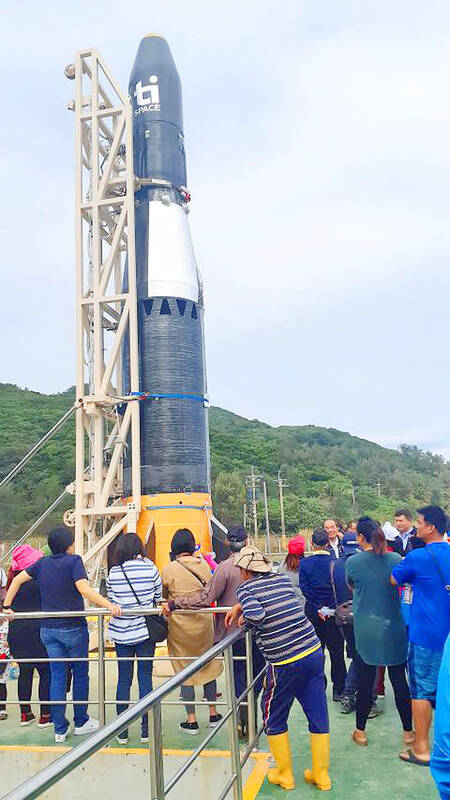Taiwan could launch a domestically built rocket into space as soon as 2026, if the Legislative Yuan approves funding for the Siraya Rocket Plan project, National Space Organization (NSPO) Director-General Wu Jong-shinn (吳宗信) said.
Researchers would next year start work on the project, which was named after the indigenous Siraya people, Wu said on Friday.
If successful, it would be the first rocket to be designed, built and launched entirely in Taiwan — a milestone for the nation’s emerging space industry, he said.

Photo: Yang Yuan-ting, Taipei Times
The NSPO is next year to be reorganized into a legal entity, and renamed the Taiwan Space Agency (TASA), he said, adding that Siraya would be the agency’s first project.
“The project will allow us to test domestically designed and built components for the space industry,” he said.
Under the Space Development Act (太空發展法), the NSPO — and later, TASA — is responsible for construction of a national rocket launch site, he said.

Photo courtesy of Taiwan Innovative Space Inc
The launch site in Syuhai Village (旭海) in Pingtung County’s Mudan Township (牡丹), which the NSPO has used in the past, is suitable for smaller launches, but not for large projects such as Siraya, he said.
A bigger site would be built in either Pingtung County or Taitung County, he said, adding that a selection committee would choose the site based on criteria drafted by the NSPO.
Some of the criteria include transportation options to the site, and whether there are people living within a 2km radius, he said.
“The Siraya rocket project will involve roughly three to four years of planning, which is significantly less time than South Korea’s Nuri rocket took,” he said. “Work started on Nuri in 2010, and it did not launch until October last year.”
Wu said he also expects Siraya to be cheaper than the Nuri project, which cost US$1.7 billion, including the spaceport.

A magnitude 5.6 earthquake struck off the coast of Yilan County at 12:37pm today, with clear shaking felt across much of northern Taiwan. There were no immediate reports of damage. The epicenter of the quake was 16.9km east-southeast of Yilan County Hall offshore at a depth of 66.8km, Central Weather Administration (CWA) data showed. The maximum intensity registered at a 4 in Yilan County’s Nanao Township (南澳) on Taiwan’s seven-tier scale. Other parts of Yilan, as well as certain areas of Hualien County, Taipei, New Taipei City, Taoyuan, Hsinchu County, Taichung and Miaoli County, recorded intensities of 3. Residents of Yilan County and Taipei received

Taiwan has secured another breakthrough in fruit exports, with jujubes, dragon fruit and lychees approved for shipment to the EU, the Ministry of Agriculture said yesterday. The Animal and Plant Health Inspection Agency on Thursday received formal notification of the approval from the EU, the ministry said, adding that the decision was expected to expand Taiwanese fruit producers’ access to high-end European markets. Taiwan exported 126 tonnes of lychees last year, valued at US$1.48 million, with Japan accounting for 102 tonnes. Other export destinations included New Zealand, Hong Kong, the US and Australia, ministry data showed. Jujube exports totaled 103 tonnes, valued at

BIG SPENDERS: Foreign investors bought the most Taiwan equities since 2005, signaling confidence that an AI boom would continue to benefit chipmakers Taiwan Semiconductor Manufacturing Co’s (TSMC, 台積電) market capitalization swelled to US$2 trillion for the first time following a 4.25 percent rally in its American depositary receipts (ADR) overnight, putting the world’s biggest contract chipmaker sixth on the list of the world’s biggest companies by market capitalization, just behind Amazon.com Inc. The site CompaniesMarketcap.com ranked TSMC ahead of Saudi Aramco and Meta Platforms Inc. The Taiwanese company’s ADRs on Tuesday surged to US$385.75 on the New York Stock Exchange, as strong demand for artificial intelligence (AI) applications led to chip supply constraints and boost revenue growth to record-breaking levels. Each TSMC ADR represents

TRUST: The KMT said it respected the US’ timing and considerations, and hoped it would continue to honor its commitments to helping Taiwan bolster its defenses and deterrence US President Donald Trump is delaying a multibillion-dollar arms sale to Taiwan to ensure his visit to Beijing is successful, a New York Times report said. The weapons sales package has stalled in the US Department of State, the report said, citing US officials it did not identify. The White House has told agencies not to push forward ahead of Trump’s meeting with Chinese President Xi Jinping (習近平), it said. The two last month held a phone call to discuss trade and geopolitical flashpoints ahead of the summit. Xi raised the Taiwan issue and urged the US to handle arms sales to